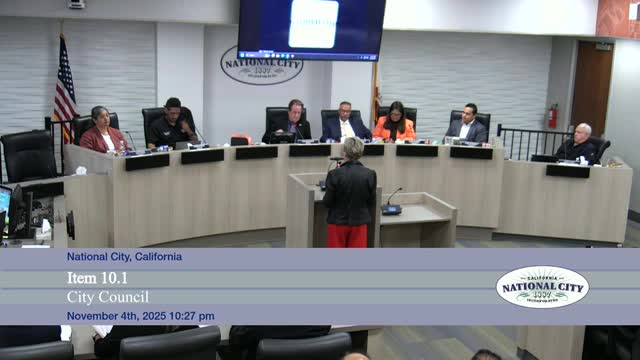National City adopts tobacco retail licensing ordinance to curb youth vaping and impose local penalties
Get AI-powered insights, summaries, and transcripts
Subscribe
Summary
National City's council voted unanimously to adopt a tobacco retail licensing ordinance that requires a city license to sell tobacco and nicotine products, refines signage and distance rules, and imposes progressive fines and suspensions for illegal sales to minors and other violations.
National City's council adopted a local tobacco retail licensing ordinance designed to tighten retail access to tobacco and high-nicotine products and to give the city clearer enforcement tools against illegal sales to minors and flavored-product marketing.
The ordinance, adopted unanimously, requires every retailer to hold a local TRL to lawfully sell tobacco and nicotine products within city limits; it refines signage rules, clarifies that licenses are not transferable between locations (while allowing ownership transfers at the same site), and establishes a tiered penalty schedule for sales violations. Under the adopted penalties, repeated selling violations within the ordinance's look-back window trigger progressively higher fines and suspensions, up to revocation for multiple infractions.
Health advocates praised the measure as an important tool to reduce youth access to vapes and flavored products. Peggy Walker, a longtime tobacco-prevention advocate, urged the council to keep strong suspension lengths and to use a long look-back period for enforcement checks, arguing shorter suspensions could make fines preferable to compliance for some retailers. Retailer representatives and the Neighborhood Market Association asked for narrow clarifications to ensure that long-standing, law-abiding local businesses not be punished if they change proprietors but keep the same physical location; council preserved the ability for ownership transfers at the same address while preventing license transfers to a new site.
Councilmembers emphasized enforcement capacity and implementation: staff will produce procedural guidance and an outreach plan to licensees that details inspection cadence, decoy operations and administrative procedures for fines and suspensions. Councilmembers also asked that staff continue to refine implementation materials and provide training to code and enforcement officers.
Implementation notes: The ordinance adoption directs staff to implement the TRL program, produce forms and procedures for license applications and renewals, and to return to council with any recommended adjustments after the first year of implementation. Staff and the city attorney will coordinate on the program rollout and public notices to retail locations.
Why it matters: Council members framed the change as both a public-health intervention and a regulation that protects responsible retailers by leveling the regulatory playing field. The ordinance provides local authorities clearer penalties and a municipal licensing mechanism to complement state laws aimed at restricting youth access to nicotine products.
